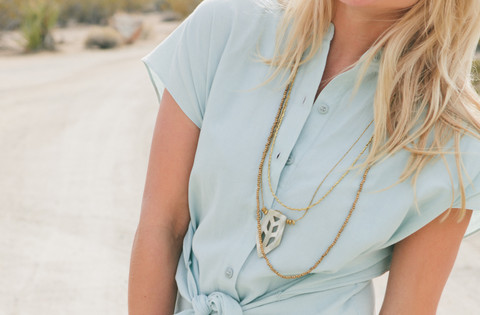June 8th is World Ocean's Day. You could celebrate by adopting a whale, or cleaning up a beach - or... by shopping? The clothing industry is one of the biggest threats to our environment, but as I recently learned, there's a ton of space age technology already in the works to bump it down the list (self cleansing fabric, anyone??)
I sat down with designer, writer and sustainability expert, Lindsay Mann who spells out the truth behind garment manufacturing, and how to buy better, smarter and less.
What's your background?
I’m a clothing designer and a writer. I’ve been working in the fashion industry since I was 17. I studied sociology and creative writing at Sarah Lawrence and graduated from FIT, where I specialized in knitwear design.
What are you up to these days?
I currently work in sustainable and domestic manufacturing as a consultant for WHOLEGARMENT® design, AKA 3D knitting. WHOLEGARMENT® knitting machines knit a complete sweater as one whole piece. The production is more sustainable, less labor intensive, and the garment quality is superior in drape and comfortability, being completely seam-free. Some very reputable brands are using the technology, they just aren’t advertising it!
So what is so bad about standard garment production and why should we care?
The production of thousands, or millions, of units of one style can create an unbelievable amount of waste material. The production waste, and eventually the clothes, end up in landfills in poor communities and poor countries all over the world.
The lifespan of cheap clothing is very short. It goes too quickly from production into a landfill where it can stay forever, depending on the material, especially synthetic fibers.
“Imagine factories pumping out garbage all day every day. That’s pretty much what’s happened.”
Aside from overproduction, the chemicals used in a variety of processes pollute the land, water, and air and it requires a lot of energy to run a factory 24/7. I won’t get into the often unethical treatment of laborers. In short, it’s excessive, unregulated, and we don’t really NEED all of these things that are being produced. We should care because we’ve all contributed to this mess. We have to change our ways and be more responsible.
What's the most important change that the fashion industry needs to make to become more sustainable?
Companies need to change the materials they use if they’re going to keep producing these numbers. And immediately. Biodegradable materials would be best. Second best is recycled materials.
As far as biodegradable materials, wool and hemp are great. Cotton is biodegradable, but the amount of water used to process it is high. Hemp's water usage is very low and I love wool for all of it’s natural performance properties.
What are some things being done to improve the situation?
There’s a lot of new development in smart textiles. I recently learned about clothing that never needs to be washed and self cleans in the sun. There are also efforts being made to collect plastic garbage from our oceans and spin it into recycled material for new clothing.
What can we look out for if we want to be more conscious about what we buy?
Although every time we shop we vote with our dollar, I don’t want to place the burden entirely on the consumer. It’s the designers and brands that need to take up the cause and offer this to you. If you need to buy a new t-shirt, go buy a t-shirt. If it happens to be made of natural biodegradable fibers, recycled materials, and/or Made in USA, you can feel pretty good about your purchase.
“Buying Made in USA products is good for two reasons: you’re reducing the carbon footprint that comes with distribution and you’re supporting our economy. ”
What are some of your favorite brands that are spearheading sustainable style?
Outlier is a menswear brand that doesn’t advertise themselves as being sustainable, the quality of their clothing makes them sustainable. The Row uses WHOLEGARMENT® knitting technology for a lot of their knit styles, although they don’t advertise that. I’m a fan of Kelly Slater’s brand, Outerknown, too.
A NATTY NOTE:
Shopping vintage is a great way to reduce, reuse, recycle! I'm wearing a vintage T from Conscious Commerce and Organize that also supports organ donation - for the ultimate recycling. Sunnies from Further Future, vintage Levi's shorts.
Wanna learn more?
Check out Lindsay's recommended reading list
- Lynda Grose, Fashion and Sustainability: Design for Change
- Timo Rissanen, Zero Waste Fashion Design
- Sass Brown, EcoFashion, Refashioned
- Rebeccah Pailes-Friedman, Smart Textiles for Designers: Inventing the Future of Fabric
- Elizabeth Cline, Overdressed: The Shockingly High Cost of Cheap Fashion












Looking to treat yourself or your bestie this Galentine’s Day? Check out these 6 goodies that love you as much as they love our planet. Think toxin-free lippies with flowers inside, sustainable fancy footwear and a guilt-free version of Nutella. Yup, you heard me…